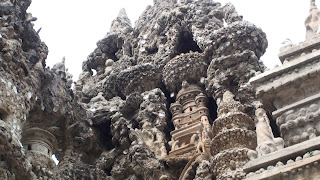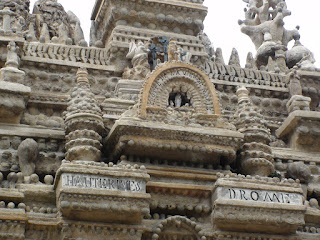“The ideal Palace of the postman Cheval”. Travel notes on France.
“Идеальный дворец почтальона Шеваля”. Путевые заметки о Франции.
«We need men who can dream of things that never were».
Kennedy,
John F.
«Нам
нужны люди, которые могут мечтать о вещах, которых никогда не было» Джон
Кеннеди.
There lived a rural postman, Joseph Ferdinand Cheval.
True, he was initially assistant baker, but in 1867 he was promoted to the
rural postman and later became a famous man better known as Ferdinand Cheval,
and even better known around the world as a postman Cheval. This imperceptible
man became the forerunner of Art Brut. He created a rural postman palace known
worldwide as the "Ideal Palace of Postman Cheval", included in the
top ten most unusual castles in the world, an impressive monument of naive
architecture.
Жил
да был сельский почтальон Жозеф Фердинан Шеваль. Правда сначала он был
помощником пекаря, но в 1867 году он получил должность сельского почтальона и в
последствии стал знаменитым человеком более известным как Фердинанд Шеваль, а ещё
более известный всему миру как почтальон Шеваль. Этот незаметный человек стал предтечей АР
БРЮТ. Им был создан дворец сельского почтальона известный всему миру как
«Идеальный дворец почтальона Шеваля», входящий в десятку самых необычных замков
мира, впечатляющий памятник наивной архитектуры.
At age 32, Ferdinand and his wife moved to a small
village of Hauterive, where he was offered the position of the rural postman.
Work hard in the day sometimes had to pass through 25 km to deliver the parcel
or mail. Often he had to sleep in abandoned houses, shelter from inclement
weather under the trees and caves.
В
32 года Фердинанд вместе с женой переезжает в небольшую деревушку Hauterive,
где ему была предложена должность сельского почтальона. Работа тяжелая, в день
иногда приходилось проходить по 25 км, чтобы доставить посылку или почту. Часто
приходилось ночевать в заброшенных домах, укрываться от непогоды под деревьями
и гротах.
At such moments of loneliness he regarded brands,
newspapers, postcards, which are often encountered images of world
architectural masterpieces. Perhaps it was then that he had a dream of his own
castle, beautiful, unusual, which would be similar to all the castles and
palaces of the world, but it would be his own.
Вот
в такие минуты одиночества он и рассматривал марки, газеты, почтовые открытки,
на которых часто встречались изображения мировых архитектурных шедевров.
Возможно, что именно тогда у него появилась мечта о собственном замке,
прекрасном, необычном, который был бы похож на все замки и дворцы мира, но был
бы его собственным.
Legend says that the impetus for the beginning of the
dream served as an unusual form of stone, on which he stumbled during one of
his trips. Ironically, he took the stone with him. But in my head already
beginning to ripen the idea - "I have no money to build my castle, so I
have to take what nature has to offer." And he begins to
gather "strange stone".
Легенда
утверждает, что толчком к началу осуществления мечты послужил камень необычной
формы, о который он споткнулся во время одного из своих походов. По иронии
судьбы, он взял этот камень с собой. Но в голове уже начала зреть мысль – «У
меня нет средств на строительства моего замка, значит, мне надо брать то, что
предлагает природа». И он начинает собирать «странные камни».
From that day delivering mail, he took with him the
cart in which they put interesting and unusual, from his point of view, the
rocks that he found on the road. His discoveries he piled in the yard. In the
village he was considered a weirdo. But little by little, and for twenty years,
Ferdinand has collected a sufficient number of stones to begin to fulfill his
dream – to build their own castle. The construction of the
Palace began in 1888.
С
этого дня разнося почту, он брал с собой тележку, в которую складывал
интересные и необычные, с его точки зрения, камни, которые попадались ему по
дороге. Свои находки он складывал во дворе дома. В деревне его считали чудаком.
Но мало-по-малу и за двадцать лет Фердинанд собрал достаточное количество камней,
чтобы приступить к исполнению своей мечты – строительству собственного замка.
Строительство дворца началось в 1888 году.
All the free time tirelessly, and sometimes at night
by the light of a kerosene lamp he built his Palace. And so from the first
stone that was in his pouch, to the last, is omitted in the grout, gone 33
years.
Все
свободное время не покладая рук, иногда и ночью при свете керосинового фонаря
он строил свой дворец. И так от первого камня, который попал в его почтовую
сумку, до последнего, опущенного на цементный раствор, ушло 33 года.
After completing the work worthy of the Titans, Cheval
written above the entrance to the palace: «Plus opiniâtre que moi se mettre à
l'oeuvre» ( «Now let the work taken more stubborn than I am"). But the
adventure did not end there. Ferdinand wanted to be buried in his palace, but
the local authorities refused to allow him in this, then he turned the family
vault in the eight years of the same titanic work in the "Shrine of
silence and infinite peace."
Завершив
работу достойную Титанов, Шеваль написал над входом во дворец: «Plus opiniâtre
que moi se mettre à l'oeuvre» («Пусть теперь за работу принимается более
упорный, чем я»). Однако приключение на этом не закончилось. Фердинанд хотел
быть похороненым в своем дворце, но местные власти отказали ему в этом, тогда
он за восемь лет такого же титанического труда превратил семейный склеп в «Усыпальницу
молчания и бесконечного покоя».
The inscription on the facade of the palace:
"10,000 days, 93,000 hours, 33 years" makes believe that in reality,
you can turn any dream. And no matter how much you are rich, educated or
powerful.
Надпись
на фасаде дворца: «10000 дней, 93000 часов, 33 года» заставляет поверить в то,
что в реальность можно превратить любую мечту. И не важно, на сколько ты богат,
образован или силен.
In 1924, the genius of the eccentric architect
Ferdinand Cheval did not.
В
1924 году гениального чудака-архитектора Фердинанда Шеваля не стало.
That built Cheval is the sum of his ideas about the
world, the mix of architectural styles around the world and all destinations in
one. There were mixed Egypt and Rome, the Aztecs and the Mayans, Siam and India
and others, but all of that has led to the fact that They created a new style
in architecture – the style of the postman Cheval, which was later named art
BRUT (rough art). This term refers to the works of the masters, which from a
social point of view are marginalized and their work do not consider the
arrangements for the credibility, the scenic prospect and the conditional
scale, there is no distinction between reality and fiction, does not recognize
the hierarchy of materials, etc.
То,
что построил Шеваль – это сумма его представлений о мире, сочетание
архитектурных стилей всего света и всех направлений в одном. Здесь смешались
Египет и Рим, Ацтеки и Майя, Сиам и Индия и другие, но все это вместе привело к
тому что Им был создан новый стиль в архитектуре – стиль почтальона Шеваля,
который позднее был назван АР БРЮТ (грубое искусство). Этим термином называют
работы мастеров, которые с общественной точки зрения являются маргиналами, а их
работы не считаются с договоренностями о правдоподобии, живописной перспективе
и условных масштабах, в них нет разграничения между реальностью и фантастикой,
не признается иерархия материалов и т.п.
In 30-ies of XX century, the palace received the moral
support of Pablo Picasso and Andre Breton. In 1969, ideal palace, and in 1975
and the The Shrine of, officially recognized by the government of Charles de
Gaulle's historical and cultural monuments. Effect of a simple postman
creations can be seen in the sculptures of Robert Tatena and Niki de Saint
Phalle.
В
30–х годах XX века дворец получил моральную поддержку Пабло
Пикассо и Андре Бретона. В 1969 году Идеальный дворец, а
в 1975 и Усыпальница,
официально признаны правительством Шарля де Голля памятниками
истории и культуры. Влияние творения простого почтальона прослеживается в
скульптурах Робера Татена и Ники де Сен-Фалль.
Chevalier devoted to Chris Marker's film «Le Facteur
sonne toujours cheval» (1992) and the film of the Moscow Museum of Outsider Art
"Ideal Palace postman Cheval" (2008).
Шевалю
посвящён фильм Криса Маркера «Le Facteur sonne
toujours cheval» (1992)
и фильм Московского
музея творчества аутсайдеров «Идеальный дворец
почтальона Шеваля» (2008).



































Комментариев нет:
Отправить комментарий